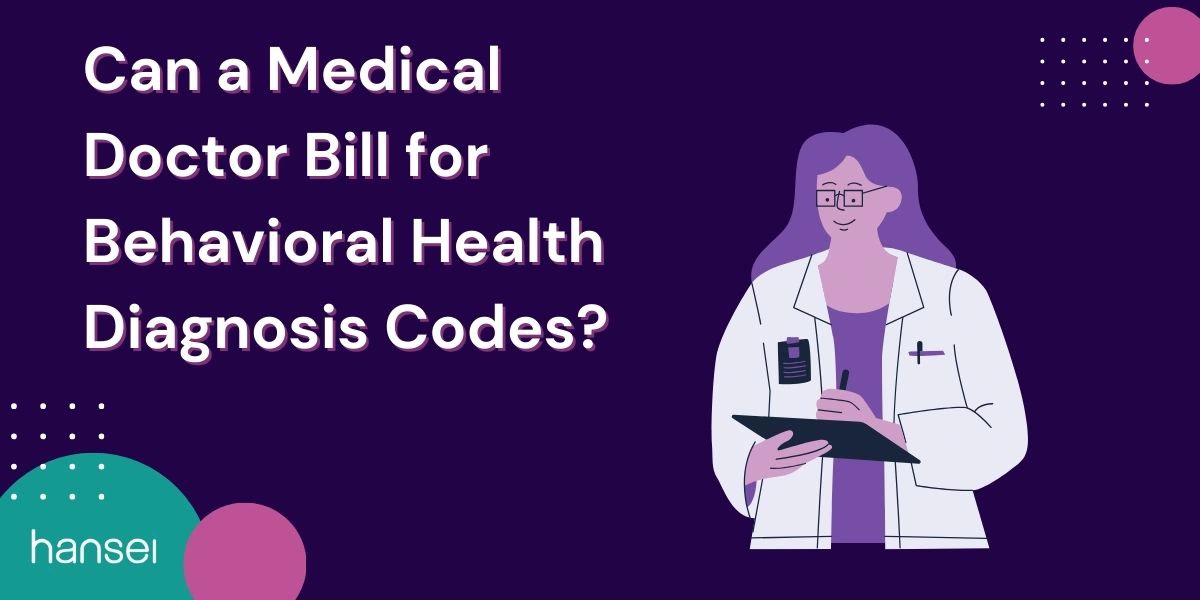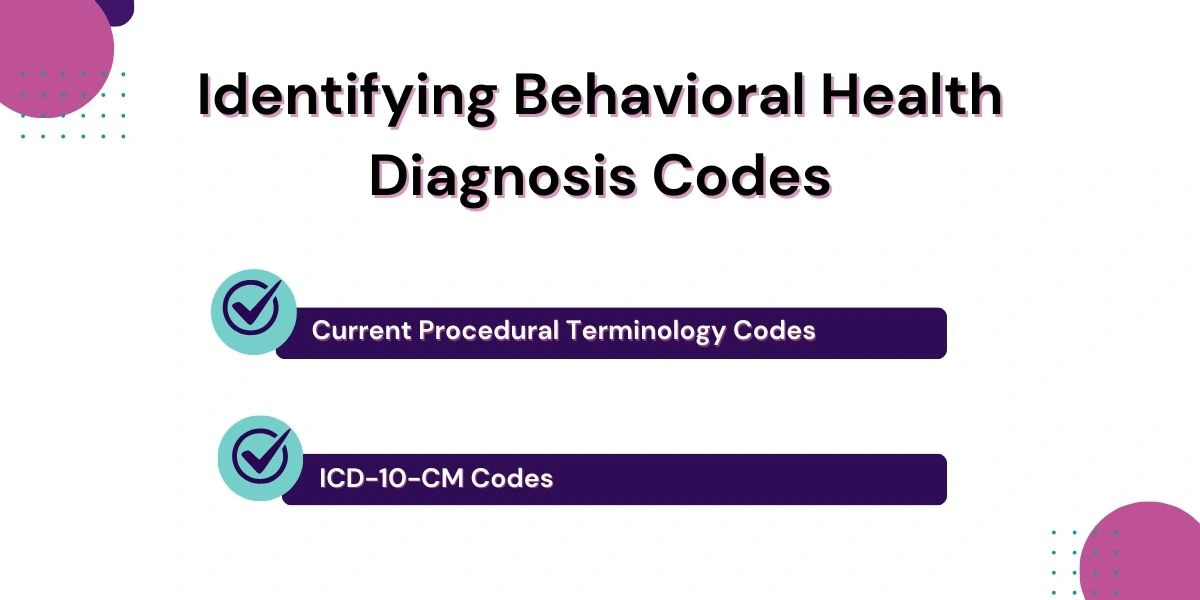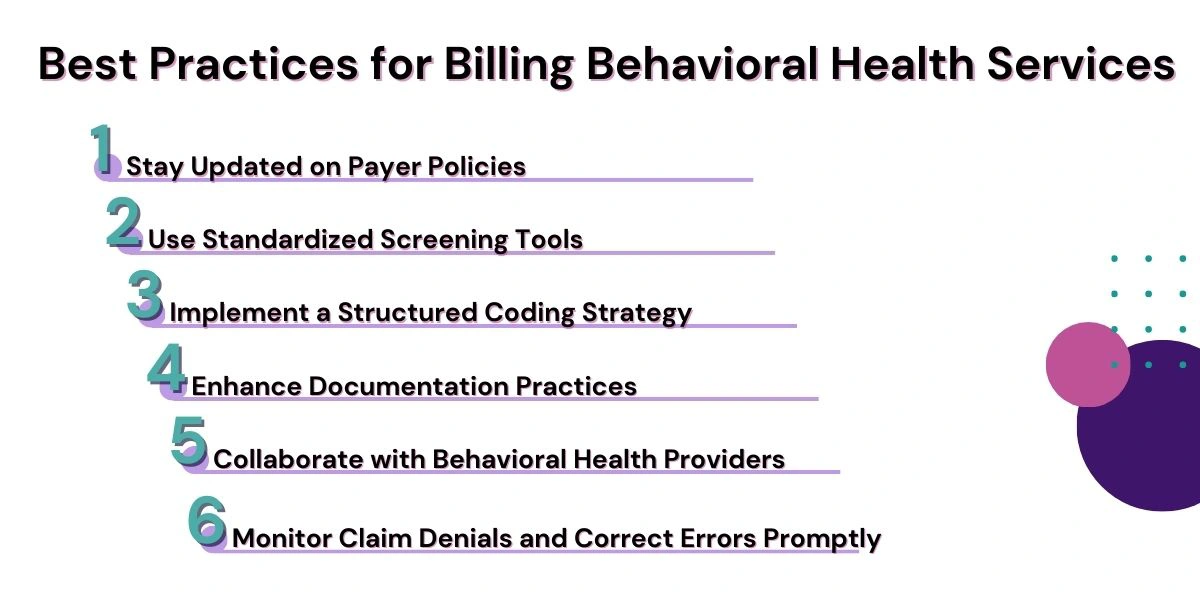Blog

Behavioral health issues, including mental health disorders and substance use conditions, are increasingly recognized as critical components of overall patient well-being. However, when it comes to medical billing, there is often confusion regarding whether a medical doctor (MD) can bill for behavioral health diagnosis codes. The intersection of behavioral health and traditional medical services creates complexity in reimbursement, coding guidelines, and provider eligibility.

Identifying Behavioral Health Diagnosis Codes
Behavioral health diagnosis codes fall under the ICD-10-CM (International Classification of Diseases, Tenth Revision, Clinical Modification) and CPT (Current Procedural Terminology) codes that categorize mental health and substance use disorders. These diagnoses include mood disorders such as major depressive disorder, anxiety disorders like generalized anxiety disorder, and substance-related conditions including opioid dependence. These classifications help healthcare providers accurately document and report behavioral health conditions for proper billing and treatment planning.
According to the National Institute of Mental Health (NIMH), nearly 1 in 5 U.S. adults lives with a mental illness. Additionally, substance use disorders affect millions, with opioid-related deaths exceeding 80,000 in 2021.
Can Medical Doctors Bill for Behavioral Health?
Medical doctors can bill for behavioral health diagnosis codes under certain circumstances, provided they adhere to specific payer regulations and practice guidelines. Physicians, particularly those in primary care, often diagnose and treat common mental health conditions such as depression, anxiety, and ADHD. However, insurance reimbursement depends on multiple factors, including scope of practice, the type of services provided, and payer policies.
Reimbursement policies vary across insurance providers, including Medicare, Medicaid, and commercial payers. Some insurers require documentation proving the necessity of treatment by an MD rather than a behavioral health specialist. Additionally, while some insurers reimburse for mental health evaluations and medication management, others limit therapy-related reimbursements unless the MD has specific behavioral health training.
Challenges in Billing for Behavioral Health
While MDs can bill for behavioral health services, they often face hurdles in reimbursement and coding compliance. Proper documentation is critical to justify the diagnosis and treatment plan, ensuring insurance companies accept claims. Payers frequently require evidence-based screening tools, comprehensive patient history, and structured follow-up plans to validate the necessity of treatment.
Incorrect or missing documentation may lead to claim denials. Furthermore, certain services require the use of modifiers, which indicate that behavioral health treatment was separate from other medical care provided during the visit. Misuse of modifiers can result in claims being rejected or subjected to an audit.
State-specific regulations may impact the ability of MDs to bill for behavioral health services. Some states impose additional restrictions on primary care physicians providing mental health treatment, particularly through Medicaid programs, which vary widely in their reimbursement structures for behavioral health services delivered by MDs.
Collaborative Care and Behavioral Health Integration
Many medical practices adopt Collaborative Care Models (CoCM) or Behavioral Health Integration (BHI) strategies to address behavioral health billing challenges. These models enable primary care physicians to collaborate with behavioral health specialists, improving patient outcomes while maximizing reimbursement opportunities.
For example, Medicare offers reimbursement for BHI services provided within primary care settings when structured within a coordinated care team. This allows MDs to integrate behavioral health professionals into their practice, ensuring patients receive comprehensive mental health treatment without the reimbursement challenges associated with standalone behavioral health billing.

Best Practices for Billing Behavioral Health Services
Billing for behavioral health services requires a strategic approach to ensure accuracy, avoid claim denials, and maximize reimbursement. Follow these steps to improve your billing process:
- Stay Updated on Payer Policies
- Regularly review insurance provider guidelines for behavioral health services.
- Understand specific requirements for coverage, including prior authorizations and documentation standards.
- Use Standardized Screening Tools
- Incorporate validated assessment tools like:
- PHQ-9 for depression screening
- GAD-7 for anxiety screening
- Document screening results to support medical necessity and ensure proper coding.
- Implement a Structured Coding Strategy
- Use accurate CPT and ICD-10 codes for behavioral health diagnoses and treatments.
- Ensure documentation aligns with coding requirements to prevent claim denials.
- Train staff on behavioral health billing updates and coding changes.
- Enhance Documentation Practices
- Record detailed visit notes, including symptoms, treatment plans, and follow-up recommendations.
- Maintain thorough documentation of behavioral health interventions to meet payer requirements.
- Leverage electronic health records (EHRs) to streamline documentation and ensure compliance.
- Collaborate with Behavioral Health Providers
- Establish partnerships with licensed therapists, psychiatrists, or social workers.
- Coordinate care within primary care settings to expand mental health services and reimbursement opportunities.
- Monitor Claim Denials and Correct Errors Promptly
- Regularly review denial trends to identify common billing mistakes.
- Analyze payer feedback and correct errors before resubmitting claims.
- Appeal denied claims when appropriate, ensuring all necessary documentation is included.
By following these best practices, medical doctors can improve billing accuracy, reduce revenue loss, and enhance patient care in behavioral health services.
Supporting Medical Billing for Behavioral Health
As behavioral health continues to gain recognition as an essential component of comprehensive healthcare, maintaining accurate billing practices will help providers meet patient needs while navigating the complexities of insurance reimbursement. Ensuring compliance with medical necessity documentation and payer policies will enable medical doctors to expand behavioral health services, ultimately improving patient outcomes and access to mental health care. Hansei Solutions provides expert guidance and support in medical billing, helping healthcare providers streamline their behavioral health billing processes while maximizing reimbursement opportunities. Contact us today for a demo.

Ready to focus on providing healthcare? Let us lighten your load.
We’re here to address your pain points and create growth opportunities for your organization. We’re passionate about what we do, and it shows in every interaction. Learn what makes us tick and schedule a demo today.